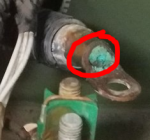dbeasty
Member
- 49
- 12
- 8
- Location
- Eastsound, wa
I have developed a strange electrical issue on my 1078 A1.
The vehicle was running like a charm, than I turned off the power disconnect next to battery. After a while turned it back on..
The LEDs were acting funny.. but the truck started,, once it started , all was good.
Than got home, turned off the engine, turned on the the interior light and it went from bright to very dim to none fairly quickly.
Troubleshooting:
1. Charged , cleaned battery connectors, and tested batteries , they are all good.
2. Went to can and started to measure in the fuse box, the 12V battery is just showing 4V.. the 24V battery is showing 24V...
3. Unhooked the 12V battery cable that connects to the back of the fuse box, just to make sure and still measured 4V...
4. I started to disconnect the relays and fuses, but canceled that effort since it made me think the problem is somewhere between the batteries ( which read over 12V ) and the fuse box..
5. Open the switch box , on left there was 24V going through all the way on the right there was going 12V past the switch into a what I think is a relay and only 5V out
So I think the issue the relay or things which feed it ( 12V to 5V makes me think its a relay)..,, so cleaning the contacts and all that good stuff meanwhile.
There are two wires going to the relay from the left and one from the right, any ideas what those are for..?
If cleaning does not work shall I take the relay out and test it somehow?? In short term can I just bypass it??
Is there a thread that covers this issue , so I can read up, or any suggestions. I will update as I go on..
The vehicle was running like a charm, than I turned off the power disconnect next to battery. After a while turned it back on..
The LEDs were acting funny.. but the truck started,, once it started , all was good.
Than got home, turned off the engine, turned on the the interior light and it went from bright to very dim to none fairly quickly.
Troubleshooting:
1. Charged , cleaned battery connectors, and tested batteries , they are all good.
2. Went to can and started to measure in the fuse box, the 12V battery is just showing 4V.. the 24V battery is showing 24V...
3. Unhooked the 12V battery cable that connects to the back of the fuse box, just to make sure and still measured 4V...
4. I started to disconnect the relays and fuses, but canceled that effort since it made me think the problem is somewhere between the batteries ( which read over 12V ) and the fuse box..
5. Open the switch box , on left there was 24V going through all the way on the right there was going 12V past the switch into a what I think is a relay and only 5V out
So I think the issue the relay or things which feed it ( 12V to 5V makes me think its a relay)..,, so cleaning the contacts and all that good stuff meanwhile.
There are two wires going to the relay from the left and one from the right, any ideas what those are for..?
If cleaning does not work shall I take the relay out and test it somehow?? In short term can I just bypass it??
Is there a thread that covers this issue , so I can read up, or any suggestions. I will update as I go on..
Last edited:








